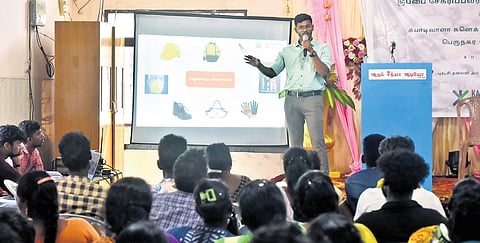

CHENNAI: ‘Enadhu kuppai, enadhu porupu, ena urudhi alaipomae’. Most of us wake up to these lyrics played on the garbage pickup vehicles. This song is the citizens’ alarm to create a society with proper waste management system and educates them to segregate waste.
After the first level of segregation at home, the garbage collectors separate dry and wet waste. Then, waste pickers divide paper-based products into cardboard, newspapers, white and coloured; metals into aluminium, copper, and brass; and plastics into pet bottles, and dolls. They sell these products to recycle shops and earn money. “Our livelihoods are dependent on selling this waste,” says Kuppai, a waste picker from Perungudi.
To increase income generation opportunities and improve health for waste pickers in the city, Kabadiwalla Connect, a waste management solutions provider, and the Tamil Nadu Pollution Control Board (TNPCB), conducted a workshop on Friday where 200 rag pickers gathered. The session, ‘Capacity Building Program for Rag Pickers - Zone 13 and 14 of GCC’ is part of the announcement made by Environment and Climate Change Minister Siva V Meyyanathan’s in the state assembly in April 2023 where he said a survey would be done to assess the number of rag pickers and a training programme would be imparted.
Kabadiwalla surveyed 600 workers in the last six months. “We found out that they work in unhygienic conditions and are missing out on additional means of income,” says Swathi Lakshmi, research manager, Kabadiwalla Connect. At this interactive session, a training manual was launched by Dinakaran M, DEE, Chennai South and R Menagha, AEE, TNPCB.
It includes a list of waste to be segregated, government documents one should have, and helpline numbers. “Plastic could further be segregated into black plastic, PVC pipes, and metal into steel and iron. Glass bottles can be collected and sent to recycling facilities,” she points out.
While workshops are helpful, Kuppai raises a few on-ground concerns, “We do not have facilities to assemble the waste, store them, and transport them to the shop. We do not get a salary. Only the recyclers pay us. If we earn `300 for 150 kg of glass, the lorry driver charges us `150. Even the gloves provided to us are not useful; we suffer injuries. The government should ask us about our needs and act accordingly.”
The Kabadiwalla team has noted the requests and plans to present them to the ministry.